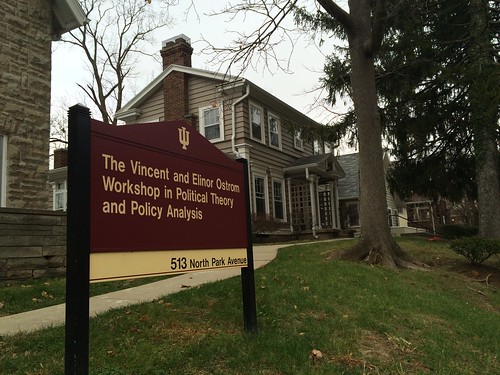I spent this week at an authors’ workshop for a book on polycentricity and a special issue of a journal. This workshop was convened by Andreas Thiel, Dustin Garrick and Bill Blomquist, and generously partially funded by a grant that supports Andreas’ work. We were hosted at a familiar space for many of us, the Ostrom Workshop on Political Theory and Policy Analysis at the University of Indiana, in Bloomington.

I have been here many a time, the two most recent were in the Spring of 2015 when I was invited to present a paper at the Colloquium Series, and last year for the 5th Workshop on the Ostrom Workshop (WOW5). In March, I presented my research on the application of IAD to the study of river basin councils, especially for sanitation and wastewater governance. Last year, I presented at WOW5 on polycentricity theory and its aplication to Mexican water policy. And of course, I’ve seen my friends who have had a connection with the Ostrom many times in recent years, at the International Association for the Study of the Commons (IASC 2013 in Fujiyoshida, Japan and IASC 2015 in Edmonton, Canada).
This workshop reminded me of the times when I had conversations with Lin and Vincent. Any feedback they offered was always couched in kind words. I never heard them speak ill of anybody, and their philosophy towards students and junior faculty was always to be generous, positive and to offer many suggestions for improvement. When we were driving after one of the afternoon sessions towards our respective dinner engagements, my friend Liz Baldwin mentioned something that I’ve felt extremely strongly in the past 3-4 years, and that has reignited the fire of my own research. Liz said that the expectation if you are in this field (commons research) or associated with the Ostrom tradition (the Bloomington School, as it’s often called), you are expected to be kind, to be generous, to share information and knowledge broadly and to provide constructive feedback. It’s not only a shared norm, it’s an expectation. Given the way in which the Ostroms defined institutions, through routine engagement, they (and their collaborators, students, staff at the Ostrom Workshop and associated faculty members) created an institution in and of themselves: the Ostrom tradition. An ethics of kindness and collaboration.
I have rarely felt more alive, more energized, more motivated to continue doing the research I do and the work that I do than when I am among those who share the Ostrom tradition. It’s electrifying. It’s reinvigorating. My brain cells were working full-steam ahead. During the polycentricity workshop, I had the opportunity to listen to excellent scholars whose work I respect, share ideas in an open forum, ready to have them challenged but always willing to listen and learn. I had the same positive experience at IASC 2013 in Fujiyoshida and IASC 2015 in Edmonton.
Even more so, being part of the Ostrom tradition sort of makes you into a family, where every time you see each other (given how geographically disperse we all are throughout the world) it’s a joyous occasion. When I came to the Ostrom Workshop in March 2015, I had dinner with Mike McGinnis and Burney Fischer, dinner with Catherine Tucker and breakfast with Eduardo Brondizio, and with Charlotte Hess. Not only are these great scholars whose work I deeply respect, they are also people whom I consider good friends. And even over dinner, lunch and breakfast, they kept giving me great advice not only on my research but also on navigating the academic world. Coming back to Bloomington always feels like coming home. And this powerful emotion that often overcomes me when I am at the Ostrom Workshop is in no small part because of the Ostrom tradition and the ethic of kindness and generosity and collaboration they spearheaded.
Sometimes, fellow scholars talk about those associated with the Ostrom tradition as belonging to “The Cult”. And to be perfectly honest, given that people who are in “The Cult” are kind, generous, and collaborative, I’m happy and honored to be part of The Ostrom Cult.

0 Responses
Stay in touch with the conversation, subscribe to the RSS feed for comments on this post.